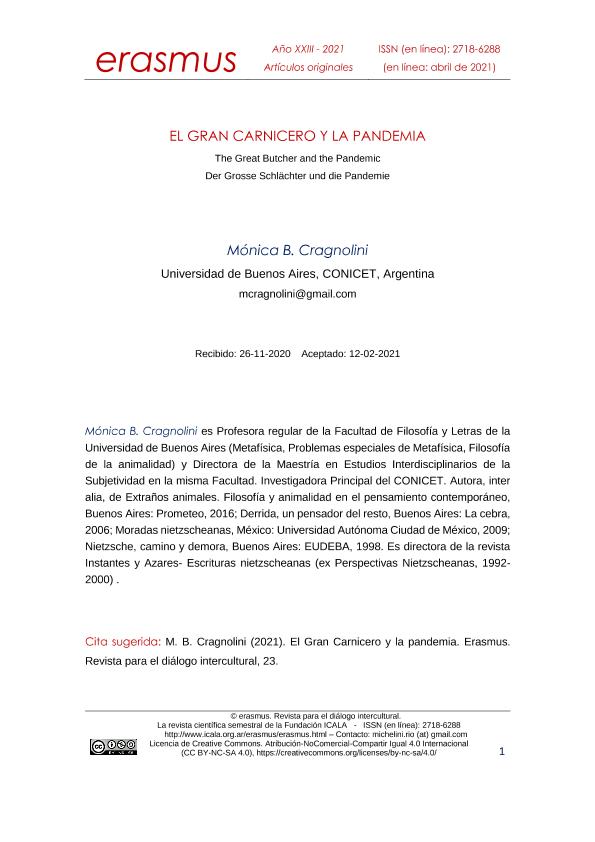Mostrar el registro sencillo del ítem
dc.contributor.author
Cragnolini, Monica Beatriz

dc.date.available
2021-08-26T01:31:05Z
dc.date.issued
2021-04
dc.identifier.citation
Cragnolini, Monica Beatriz; El Gran Carnicero y la pandemia; Fundación Intercambio Cultural Alemán - Latinoamericano; Erasmus; 23; 4-2021; 1-19
dc.identifier.uri
http://hdl.handle.net/11336/138956
dc.description.abstract
Se plantea en este artículo el vínculo entre pandemias zoonóticas de los últimos tiempos y tratamiento de los animales: ya sea de los animales de producción intensiva, que viven en condiciones de hacinamiento y stress, como de los animales salvajes, que son expulsados de sus hábitats para desmonte de bosques y uso de los suelos para monocultivos, que generalmente representan el alimento de los animales de producción. La figura del Gran Carnicero de la novela La jungla de Upton Sinclair permite pensar ese modelo capitalista de producción cárnica, que en la época actual se concentra en contadas compañías de agronegocios. Se plantea, al final, la necesidad de pensar en "otro modo de ser" diferente del sujeto que se cree dueño del mundo y de las vidas de los otros.
dc.description.abstract
In this paper, the link between recent zoonotic pandemics and treatment of animals is discussed: whether intensively produced animals, living in conditions of overcrowding and stress, or wild animals, which are expelled from their habitats to clear forests and use the soil for monocultures, which are generally used as food for production animals. The figure of the Great Butcher in Upton Sinclair´s novel The jungle allows us to think about this capitalist model of meat production, which at the present time is concentrated in few agribusiness companies. In conclusion, is necessary to think in "another way of being" different from the subject who believes himself to be the owner of the world and of the lives of others.
dc.description.abstract
Dieser Artikel untersucht den Zusammenhang zwischen zoonotischen Pandemien der letzten Zeit und der Behandlung von Tieren: seien es intensiv produzierte Nutztiere, die unter Bedingungen von Überbelegung und Stress leben, oder Wildtiere, die aus ihren Lebensräumen vertrieben werden, um Wälder zu roden, die in der Regel die Nahrung der Nutztiere darstellen, und das Land für Monokulturen zu nutzen. Die Figur des "Großen Schlächters" in Upton Sinclairs Roman Der Dschungel erlaubt es uns, über dieses kapitalistische Modell der Fleischproduktion nachzudenken, das in der heutigen Zeit in einigen wenigen Agrarkonzernen konzentriert ist. Am Ende wird das Bedürfnis geweckt, über eine "andere Art des Seins" nachzudenken, die sich von dem Subjekt unterscheidet, das denkt, dass ihm die Welt und das Leben der anderen gehört.
dc.format
application/pdf
dc.language.iso
spa
dc.publisher
Fundación Intercambio Cultural Alemán - Latinoamericano
dc.rights
info:eu-repo/semantics/openAccess
dc.rights.uri
https://creativecommons.org/licenses/by-nc-sa/2.5/ar/
dc.subject
ZOONOSIS
dc.subject
INDUSTRIA CARNICA
dc.subject
SARCOFAGIA
dc.subject
COVID-19
dc.subject.classification
Otras Filosofía, Étnica y Religión

dc.subject.classification
Filosofía, Ética y Religión

dc.subject.classification
HUMANIDADES

dc.title
El Gran Carnicero y la pandemia
dc.title
The Great Butcher and the Pandemic
dc.title
Der Grosse Schlächter und die Pandemie
dc.type
info:eu-repo/semantics/article
dc.type
info:ar-repo/semantics/artículo
dc.type
info:eu-repo/semantics/publishedVersion
dc.date.updated
2021-08-25T17:41:57Z
dc.identifier.eissn
2718-6288
dc.journal.number
23
dc.journal.pagination
1-19
dc.journal.pais
Argentina

dc.journal.ciudad
Rio Cuarto
dc.description.fil
Fil: Cragnolini, Monica Beatriz. Consejo Nacional de Investigaciones Científicas y Técnicas. Universidad de Buenos Aires; Argentina. Universidad de Buenos Aires; Argentina
dc.journal.title
Erasmus
dc.relation.alternativeid
info:eu-repo/semantics/altIdentifier/url/https://www.icala.org.ar/erasmus/erasmus.html
dc.relation.alternativeid
info:eu-repo/semantics/altIdentifier/url/https://www.icala.org.ar/erasmus/Archivo/2021/erasmus-23-2021-Cragnolini.pdf
Archivos asociados
